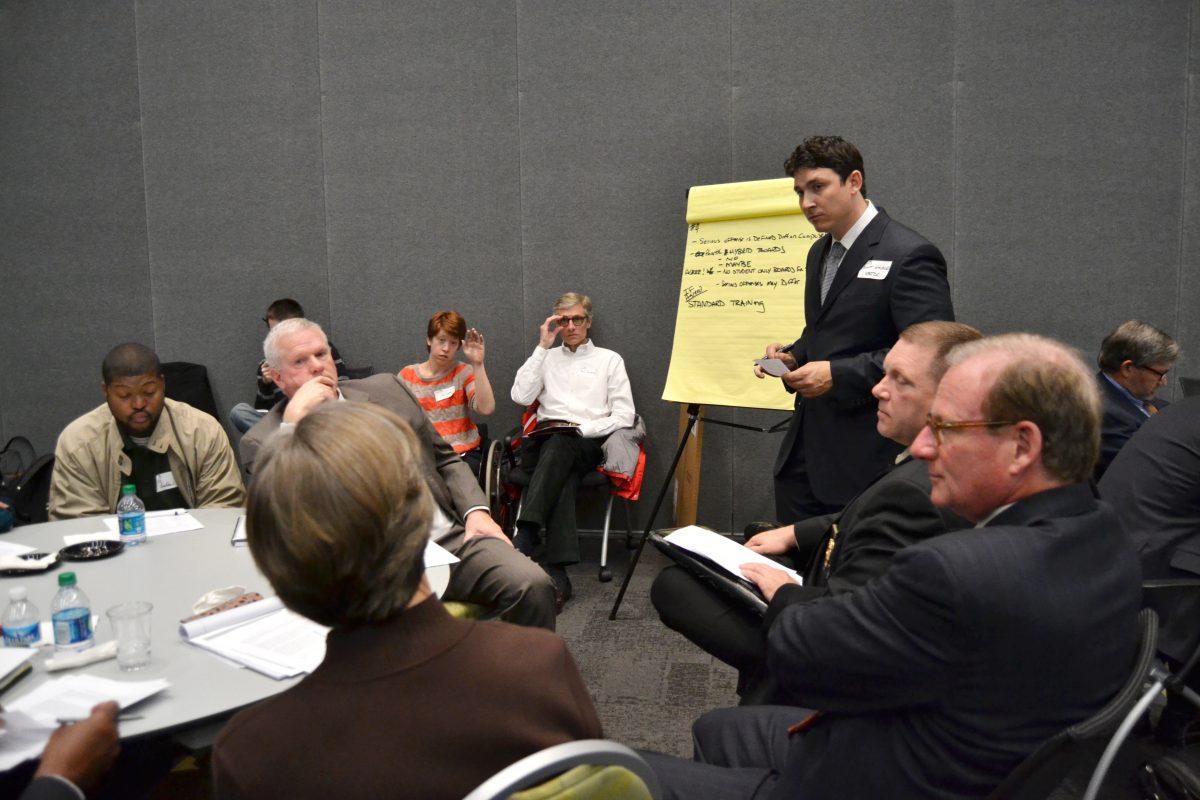
Victoria Crocker
The Campus Security Initiative held a public forum at the James B. Hunt Jr. Library on Monday. Students, staff, law enforcement, and concerned community members travelled from all over North Carolina and its universities to voice their opinions about working to raise awareness of and help address the threat posed to the educational community by sexual assault and other violent crimes, campus security, and crime reporting problems. Photographed by Victoria Crocker.
Representatives from public universities across North Carolina met at an open forum held Monday night at the Hunt library to find ways to make campus safety policies consistent state-wide.
Chancellor Randy Woodson and North Carolina Agricultural and Technical State University Chancellor, Harold Martin, co-chaired of the discussion. Conversation topics included changing the college drinking atmosphere, finding ways to improve campus safety against crime and sexual assault.
“With this forum, we are gaining a different perspective from a broad based group of community leaders and representatives,” Martin said. “Our goal is to gain big ideas that will clearly help us think through solutions.”
According to Karrie Dixon, senior associate vice president for academic and student affairs for the University of North Carolina System, the discussion was part of the 2013 UNC Campus Security Initiative to evaluate processes in promoting campus safety. Representatives from all seventeen UNC-System schools attended the form, including students, faculty members or student body presidents. Several N.C. State campus police officers also took part in the discussion.
Attendees of the forum sat in groups to brainstorm ideas about various topics such as alcohol, crime and sexual assault on campus. Ideas from each group were recorded and read aloud to the entire room once the discussion was over.
Members of the UNC- System said they want to make students aware of the law passed in April by the N.C. General Assembly that provides amnesty for a person underage that seek help during a drug or alcohol overdose. They also want to make students aware of their rights ensured in Title IX of the Education Amendments of 1972, which prohibits sexual harassment and sexual violence at universities.
Group members discussed what resources they wished they had to make campuses safer, what needs to be done to change the drug and alcohol culture at universities, if students should be on panels that hear cases of serious offenses such as sexual misconduct, and how to work with outside organizations on responding to serious offenses.
Many people said they agreed officials should teach students about the health effects of alcohol as opposed to arguing about morality. Attendees also suggested changing culture of Greek life, educating high school students about alcohol, and making sure students know the existing punishments for alcohol use.
The discussion aimed to set a standard for colleges to inform campuses about safety concerns and to address how alcohol and drugs are involved. Many participants in the discussion wanted to make sure both topics were addressed equally.
Representatives from the UNC-System said in a Campus Security Initiative report that federal statistics show the crime rate for North Carolina campuses is less than the crime rate statewide.
“Yes, we are making progress to provide a safe environment for students, faculty, and staff but we want to make more progress and do better,” Dixon said.
The Campus Security Initiative will present a report to UNC-System president, Tom Ross, in the spring of 2014 to recommend state-wide policies to improve campus safety.
Ross announced the Campus Security Initiative in June 2013, which has the goal establishing a state-regiment of responding to offenses, promoting campus public safety and implementing security reporting and awareness procedures.
Woodson said this is the first in a series of public forums being held across the state. The forum was open to the public, and students, parents and faculty members attended.
“This is a critical, important topic,” Woodson said. “We are fortunate to have a safe campus but that doesn’t mean we can’t do things better.”